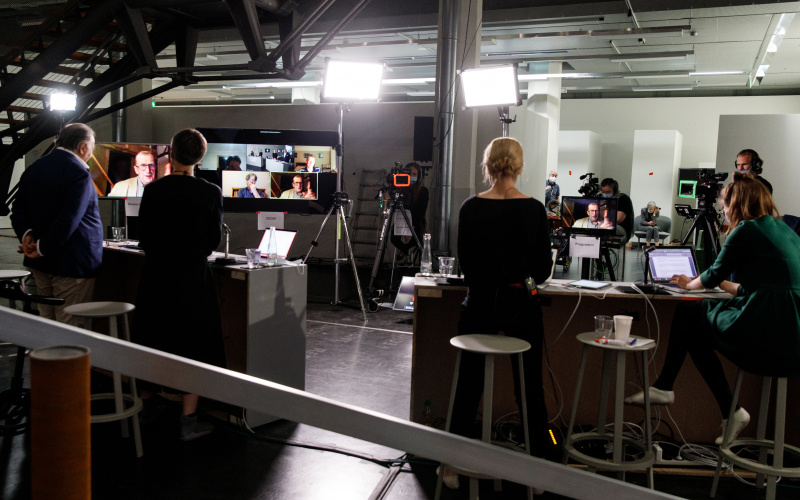ZKM Director Peter Weibel at the re:publica 2014 in Berlin
ZKM Director Peter Weibel spoke at the re: publica 2014 about the interdependence of the analog and digital worlds.
The re:publica took place in Berlin between May 6 and 8, 2014, which, following it’s founding by a meeting of German Bloggers, has since evolved into one of the most important festivals of digital society worldwide. Under the motto “Into the Wild”, in 2014, perspectives on various approaches were opened up in an endeavor to understand and improve the Internet and society of the future. Over 250 hours of program discussions were held over three days with key pioneers, co-thinkers and mavericks of the Net, from the fields of politics, the economy, science, culture and society. Sasha Lobo, German Blogger, author, journalist and copywriter, Tim Pritlove, events manager, podcaster and media artists, Saskia Sassen, North American sociologist and economist, Peter Weibel, ZKM Chairman and artist, and a multiplicity of other noteworthy representatives from science, economics and culture counted among the participants.
Peter Weibel: Infospheres and Exo-Evolution
Contemporary technical innovations, among the most decisive of which is the global Internet, constitute important preconditions for the economic, political and social developments subsumed under the term “globalization”. The cultural effects of globalization, and the reciprocal influences and challenges of various cultural conceptions are to be presented at this 300-day, polyphone event entitled GLOBALE. One point of focus here is the so-called infospheres – on which subject Peter Weibel spoke in a lecture at the re:publica, in Berlin on Wednesday May 7, 2014 – in reference to the current debates on data security and data abuse – as these present themselves in the reciprocal dependency of analog and digital world:
With a sweeping stride through history, Peter Weibel pointed out that the transfer from organs to artificial tools, from natural sense organs to machines, media devices already began appearing with the emergence of the industrial revolution: today, humanity is surrounded by information – the world is enshrouded in a cloud of databanks and data traffic: the global exchange of data, without which the present day cohabitation of seven billion people would be impossible to organize, is created by the infospheres. This is the product of exo-evolution – humanity’s stepping out of natural evolution. The human being is no longer solely a part and creation of evolution, but himself determines and transforms natural evolution into technical evolution. The infospheres are thus the technical counterpart of the atmosphere which is, in turn, the consequence of evolution. Infospheres encompass the totality of those machines, devices and media which are based on the existence of electromagnetic waves, and which suffuse the entire universe. And yet, by way of the multiplicity of environmental crises, catastrophes, civil wars and population grown, the atmosphere, our life in the analog world, is under siege.
These man-made infospheres could save the atmosphere, namely, by sensor technology, feedback technology and many other control and observation loops. They could not only create a thermodynamic equilibrium, but a social one as well. For this to be possible, however, certain behavioral rules must first be established which, though long-since created and codified for life in the atmosphere, have yet to be formulated for the digital world. For this reason, it is necessary to fight for the freedom of the network culture. It is not God, as Martin Heidegger once claimed, who can save the population of the earth, but it is man himself who must save himself and the world.
You can see all lectures of the re:publica at their YouTube channel (in German)
Category
News Category
- latest discoveries



